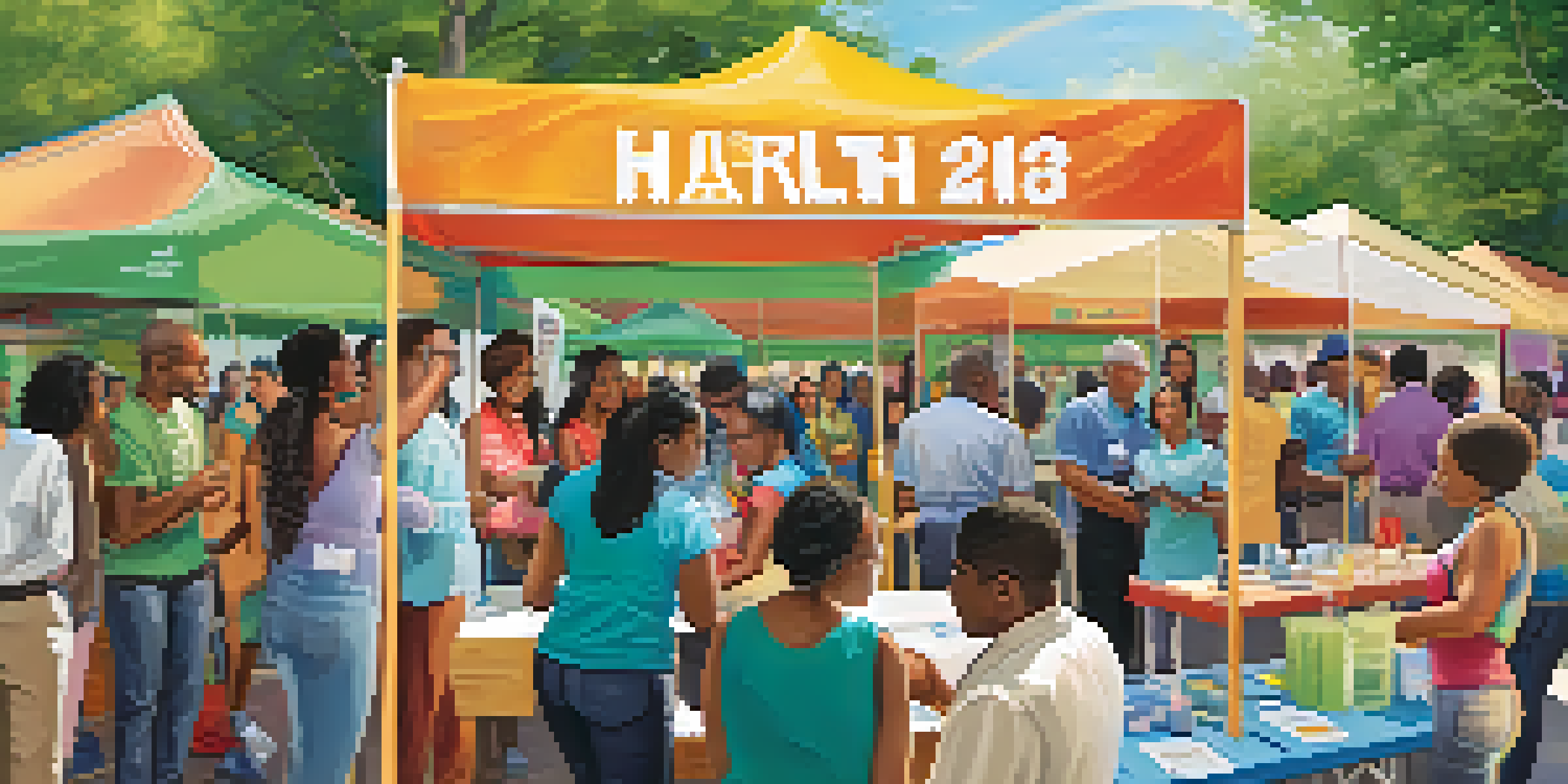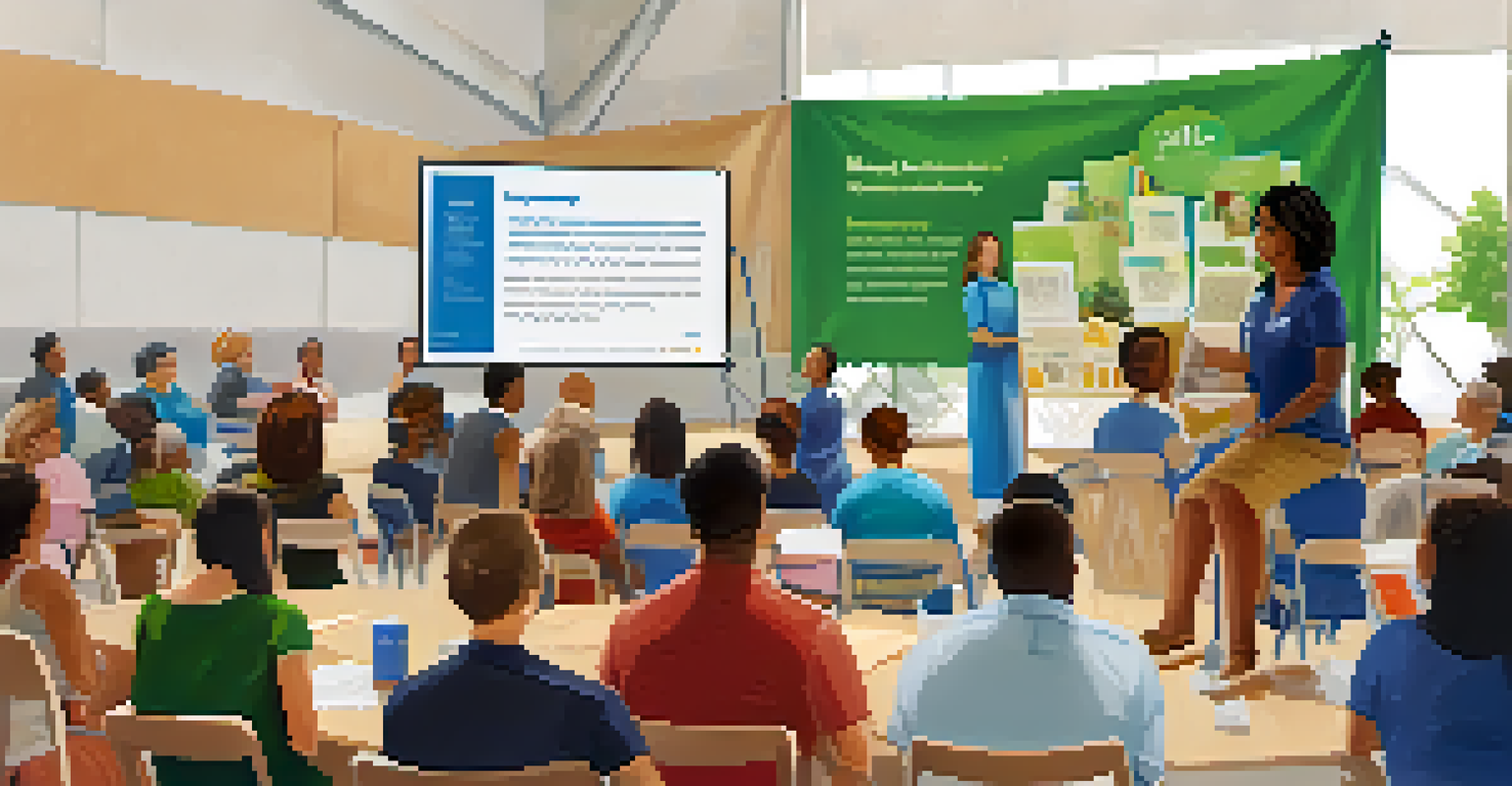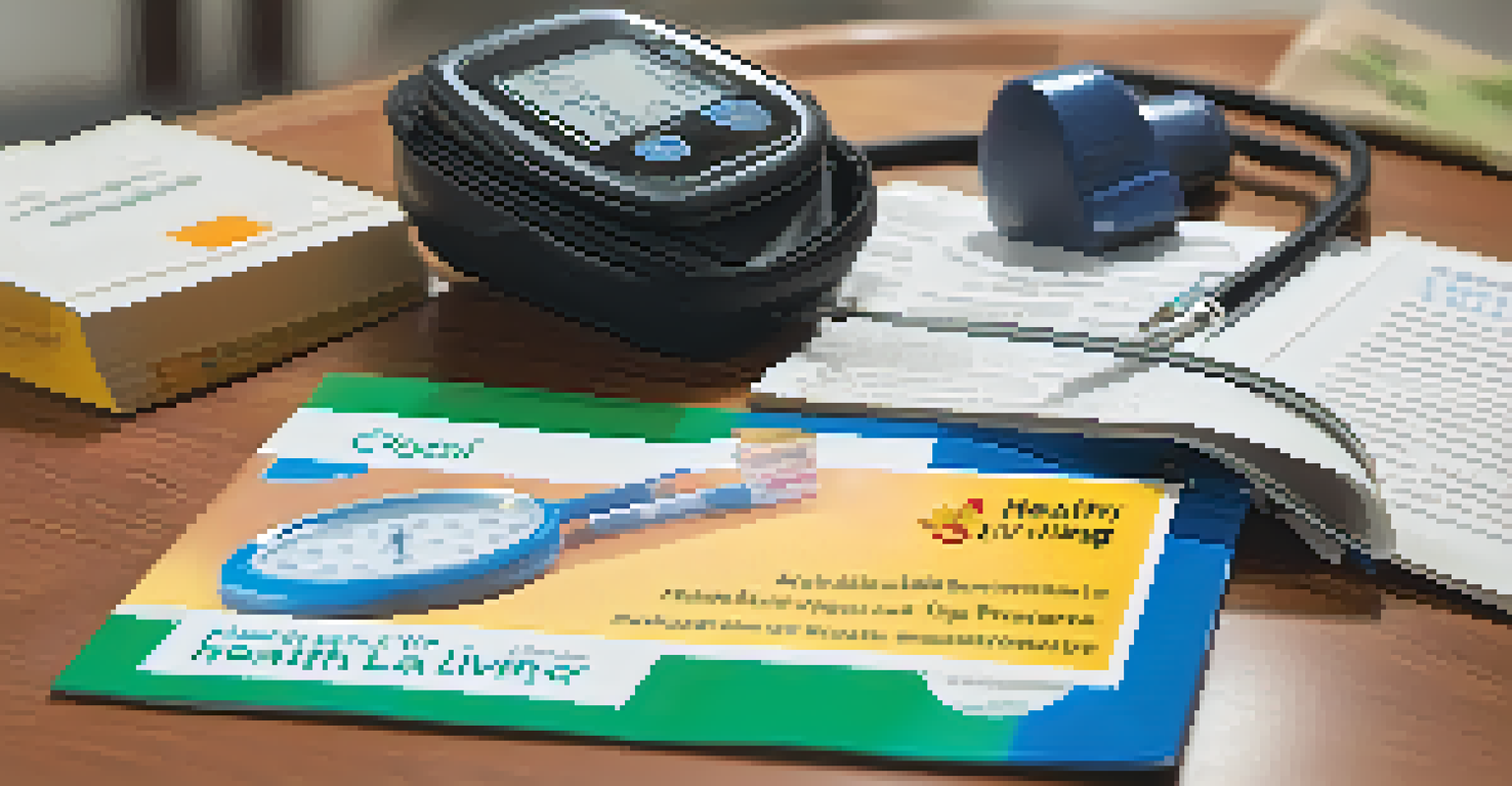Assessing the Impact of Health Fairs on Community Awareness

Introduction to Health Fairs and Their Purpose
Health fairs are community events designed to promote health awareness and provide valuable health services. They often offer free screenings, educational resources, and access to healthcare professionals. The main goal is to empower individuals with knowledge about their health and encourage proactive health management.
An ounce of prevention is worth a pound of cure.
These fairs typically focus on various health issues, from chronic diseases like diabetes and hypertension to preventive measures such as vaccinations. They create a space where community members can learn about health in an engaging environment. By fostering interaction, health fairs make health education accessible to everyone, regardless of background.
Moreover, health fairs can significantly impact public health by improving the overall health literacy of the community. When individuals are informed about health risks and resources, they are more likely to take charge of their health. This proactive approach can lead to healthier lifestyles and better health outcomes for the entire community.
Understanding Community Awareness and Its Importance
Community awareness refers to the understanding and knowledge a group of people has about health issues impacting them. It plays a crucial role in public health initiatives, as informed communities are better equipped to make healthier choices. This awareness can lead to increased participation in health programs and services.

For instance, when residents are aware of the risks associated with smoking or unhealthy diets, they are more likely to seek support and resources to change those behaviors. Health fairs serve as a catalyst for this awareness, providing a platform to share vital information and resources. Through workshops, demonstrations, and one-on-one interactions, attendees gain insights that can change their health trajectories.
Health Fairs Boost Community Awareness
Health fairs provide vital information and resources, empowering individuals to make informed health choices.
Additionally, heightened community awareness can foster a sense of collective responsibility. When people understand health issues, they can work together to support one another, creating a healthier environment overall. This collaborative spirit is essential for tackling public health challenges effectively.
Evaluating the Effectiveness of Health Fairs
To assess the impact of health fairs, it's essential to establish clear metrics for evaluation. Common metrics include attendance numbers, participant feedback, and follow-up engagement with health services. By analyzing these factors, organizers can determine the effectiveness of their events in raising awareness and promoting health.
The greatest wealth is health.
Surveys and questionnaires are often used to gather feedback from attendees. Questions might focus on what participants learned, how they plan to implement health changes, and their overall experience at the fair. This data can provide valuable insights into the strengths and weaknesses of the event, guiding improvements for future fairs.
Moreover, tracking health outcomes in the community post-fair can provide tangible evidence of impact. For example, if a health fair leads to increased screenings for high blood pressure, and subsequent data shows a decrease in hypertension cases, it underscores the fair's effectiveness. Such evaluations are crucial for justifying continued funding and support for these initiatives.
The Role of Partnerships in Health Fairs
Successful health fairs often rely on strong partnerships between local organizations, healthcare providers, and community groups. These collaborations can enhance the range of services offered at the fair and ensure that diverse health needs are addressed. By pooling resources, partners can create a more comprehensive and impactful event.
For example, a partnership between a local hospital and a nonprofit organization can lead to specialized services, such as mental health screenings or nutrition workshops. Each partner brings unique expertise and resources, enriching the overall experience for attendees. This collaborative approach also helps to maximize outreach, drawing in a broader audience.
Partnerships Enhance Event Impact
Collaborations between local organizations and healthcare providers expand services and address diverse health needs at health fairs.
In addition, partnerships can foster a sense of community ownership over health initiatives. When local organizations are involved, residents may feel more connected and invested in the outcomes. This sense of belonging can increase attendance and participation, ultimately enhancing the impact of health fairs.
Engaging the Community Before the Event
Pre-event engagement is crucial for maximizing attendance and participation at health fairs. Effective communication strategies can help generate excitement and inform the community about what to expect. Utilizing social media, local news outlets, and community bulletin boards can spread the word and create buzz.
Involving community leaders and influencers can also amplify outreach efforts. When respected figures advocate for the event, it can motivate more people to attend. Additionally, hosting informational sessions or smaller events leading up to the fair can build interest and anticipation.
Moreover, gathering input from community members about their health concerns can help tailor the event to meet their needs. By asking residents what topics or services they would find valuable, organizers can ensure that the fair is relevant and impactful. This inclusive approach fosters a sense of ownership and encourages greater participation.
Post-Event Follow-Up and Continued Engagement
The impact of health fairs doesn't end when the event concludes. Follow-up engagement is vital to ensure that the momentum built during the fair continues. Sending thank-you notes to participants, providing additional resources, or offering follow-up health services can help maintain interest and support.
Organizers can also leverage social media to share success stories and health tips after the event. This ongoing communication keeps health conversations alive and reinforces the importance of the information shared at the fair. It also encourages attendees to take action on what they learned.
Engagement Is Key to Success
Effective pre-event and post-event engagement strategies ensure higher attendance and sustained community interest in health initiatives.
Additionally, evaluating the event's success and sharing those results with the community can foster trust and transparency. When residents see tangible outcomes, such as increased access to health screenings or workshops, they are more likely to participate in future events. This cycle of engagement strengthens community health awareness over time.
Conclusion: The Lasting Impact of Health Fairs
In conclusion, health fairs play a pivotal role in enhancing community awareness and engagement regarding health issues. By providing accessible information and services, these events empower individuals to make informed health choices. The effects of health fairs can ripple throughout the community, leading to improved health outcomes.
As we assess the impact of these events, it's clear that collaboration, pre-event engagement, and post-event follow-up are essential components of success. When communities come together to address health concerns, they not only raise awareness but also foster a culture of health and well-being. This collective effort is crucial in tackling public health challenges.

Ultimately, health fairs are more than just events; they are opportunities for growth, education, and community connection. By investing in these initiatives, we can cultivate healthier communities that thrive on knowledge, support, and proactive health management.